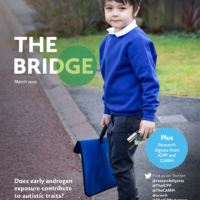Research digest
-

Do autistic girls talk differently about social groups?
New data, published in the Journal of Child Psychology and Psychiatry, suggest that pronoun use during natural conversation might inform us about clinically meaningful social function.
Read more -

Genetics research informing mental health care
Anita Thapar discusses that genetic studies of mental health have revealed important insights about the influence of genes and the environment, and the nature of disorders. She explains how these insights could improve mental health care for young people and their families now and in the future.
Read more -

Do autistic girls have better communication and interaction skills than autistic boys?
There is ongoing debate as to whether autism spectrum disorder (ASD) differentially affects males and females. Several meta-analyses have found little difference between males and females with ASD in terms of social communication and interaction skills. However, such analyses have often relied on diagnostic instruments such as the Autism Diagnostic Observation Schedule, Second Edition 2 that may not be sensitive to how autism presents in females. What’s more, many have been based on global scores, that reflect overall social communication and interaction skills, which could miss subtler differences in specific domains.
Read more -
Cognitive inflexibility contributes to both externalising and internalising difficulties in ASD
Children with autism spectrum disorder (ASD) commonly experience internalising and externalising symptoms, but the underlying cognitive mechanisms are unclear. In their latest study published in the Journal of Child Psychology and Psychiatry, Ann Ozsivadjian and colleagues examined the role of three cognitive factors that might contribute to these difficulties. Specifically, they hypothesized that intolerance of […]
Read more -

March 2021 – The Bridge
This issue includes an excellent article on mood disorders in autistic young people, written by experts Dr Emily Jackson, Dr Eleanor Smith, and Dr Aditya Sharma. The authors thoughtfully discuss the overlap between these conditions, challenges in identifying their co-occurrence, and adaptations needed for interventions.
Read more -

Is frontoamygdalar connectivity in the resting brain linked with externalising behaviours during development?
Externalising problems tend to vary over the course of development, but often peak in late adolescence. Data suggest that the frontoamygdalar brain circuitry (involved in emotion regulation) might have an important role in mediating externalising behaviour.
Read more -

Environmental factors linked with identifying as a sexual minority may increase suicidality risk
Adolescents who identify as a sexual minority (e.g., gay/lesbian, bisexual) are at an increased risk for suicidality compared to their heterosexual counterparts.1 Until now, inherent limitations in study design has meant that the extent of this association has been unclear.
Read more -

EEG data might help identify children at risk for social anxiety
Electroencephalography (EEG) is a non-invasive method to monitor the electrical activity of the brain. There are five main broad frequency bands in the EEG power spectrum: alpha, beta, gamma, delta and theta. Data suggest that EEG-derived delta–beta coupling — indicating related activity in the delta and beta frequency bands — might serve as a marker of emotion regulation.
Read more -

Does early androgen exposure contribute to autistic traits?
Researchers in Hong Kong and Cambridge have explored the influence of early androgen exposure on autistic traits during childhood.
Read more -

Cord blood metabolites linked with an ADHD diagnosis in childhood
Researchers in the USA have analysed whether the levels of branched-chain amino acids (BCAAs) detectable in maternal plasma and newborn cord blood are associated with the development of attention-deficit hyperactivity disorder (ADHD) later in childhood.
Read more